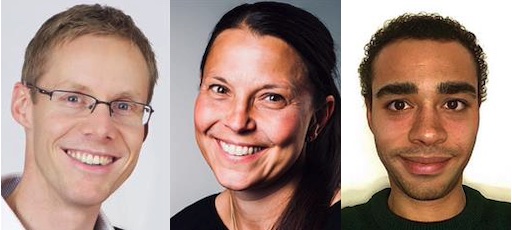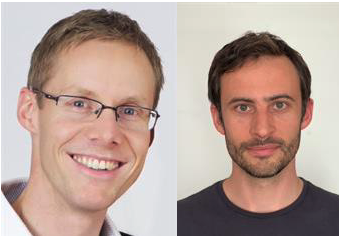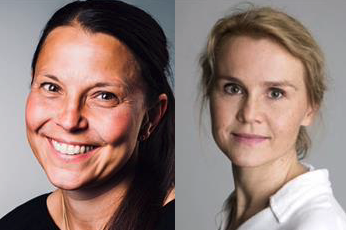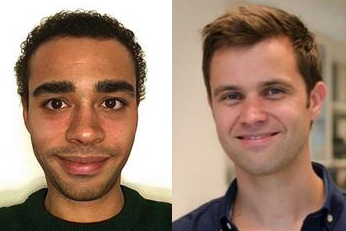Three new strategic research areas appointed by Oslo University Hospital

Following a recommendation from the hospital's external Scientific Advisory Board, the hospital management has decided to allocate funds over six years to three new strategic research areas. All initiatives are interdisciplinary and involve many clinics.
The projects will be led by John Arne Dahl, Anna-Maria Hoffmann-Vold and Xavier Tekpli, respectively, who are all particularly talented researchers at an early stage of their research careers.
Oslo University Hospital has a Scientific Advisory Board (SAB), which evaluated the applications in a two-step process. There was strong competition among 21 very good applications, submitted from 12 clinics. SAB praises the quality of the applications in its recommendation: "The SAB members were impressed by the high quality of the applications in general and identified several innovative research approaches".
Each project is awarded a total of NOK 7.2 million over a six-year period, ie NOK 1.2 million per year. The scheme was first established in 2013 and has since been somewhat adjusted in two rounds (changed duration, more frequent announcements and adjusted criteria). The plan going forward is to establish three new research areas every three years - all with a duration of six years, where there are three new and three that expire every three years.
The new strategic research areas 2022-2027:
Preservation of fertility in cancer patients
Project manager: John Arne Dahl, Department of Microbiology, Division of Laboratory Medicine
Head of the Genome and Epigenome Regulation in Embryo Development, Ageing and Disease research group
Co-project manager: Gareth Greggains, Department of Reproductive Medicine, Division of Obstretrics and Gynaecology
Member of the Reproductive Medicine Group research group (headed by Peter Fedorcsak)

Loss of fertility is a feared side effect of cancer treatment in young women, as chemotherapy –induced sterility has a profound impact on the quality of life for patients and their families. Fertility preservation is an advanced form of reproductive technology to protect fertility by cryopreservation of oocytes, embryos or ovarian tissue. We will compare fertility outcome in cancer patients undergoing fertility preservation to standard treatment and examine whether Norwegian patients have equal access to fertility preservation benchmarked to international standard. By characterizing epigenetic programming during oocyte growth, we aim at developing protocols to mature oocytes from ovarian tissue, improving treatment.
Novel personalized management strategies for fibrosing diseases
Project manager: Anna-Maria Hoffmann-Vold, Department of Rheumatology, Dermatology and Infectious Diseases, Division of Surgery, Inflammatory Diseases and Transplantation
Member of research group: Rheumatology Research Group (Group leader: Øyvind Molberg)
Co-project manager: Mona Elisabeth Rootwelt-Revheim, Division of Radiology and Nuclear Medicine
Member of the Functional and Molecular Imaging and Therapy research group (headed by Revheim)

This strategic research area establishes a multidisciplinary project consisting of 4 divisions at Oslo University Hospital (OUS). This project will strengthen the collaboration between our disciplines (rheumatology, cardiology, nuclear medicine/radiology, bioinformatics and statistics). By integration and implementation of novel molecular imaging techniques, clinical grade tools and new biomarkers directly into clinical practice we will develop personalized management approaches for patients with fibrosing diseases. This will enable highly competitive translational and clinical research, which will foster the initiation of new clinical trials, all ultimately benefiting patients with fibrosing diseases both locally, nationally and internationally.
Spatial and multi-omics characterization of single cells to overcome treatment resistance in cancer
Project manager: Xavier Tekpli, Department of Medical Genetics, Division of Laboratory Medicine
Head of the Breast Cancer Heterogeneity and Oncoimmunology project group
Co-project manager: Thomas Fleischer, Department of Cancer Genetics, Institutt for kreftforskning, Division of Cancer Medicine
Head of the Epigenomics of Breast Cancer project group

Resistance to treatment is the principal limitation for curing cancer patients.
While macroscopically, patient’s response to treatment may look satisfactory, only a few cells may have acquired resistance and are sufficient to initiate relapse. We therefore aim at analyzing each single cell of breast tumors at different molecular levels (multi-omics) to identify in single cells the mechanisms leading to treatment resistance.
Moreover, we hypothesize that for a cancer cell to become resistant to therapies, it needs to receive signals and support from the surrounding cells of the tumor microenvironment. Cancer, immune, fibroblasts and endothelial cells interact and communicate to build local ecosystems. We will characterize such tumor ecosystems using spatial resolution methods and assess their role in treatment resistance.
To bring our results from single cell and spatial resolution analyses of breast tumors closer to clinical practice and personalized medicine, we culture patient derived organoids to have the possibility to test new treatment strategies for patient relapsing or resistant to therapies directly on their corresponding ex-vivo tumor organoids.
Links:
Tre nye strategiske forskningsområder utpekt ved Oslo universitetssykehus
